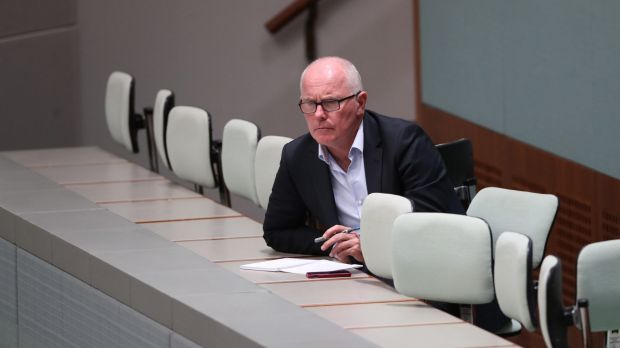It's a rare day when both a prime minister and an opposition leader shower accolades upon a journalist, particularly a political editor who has not spared their feelings in his columns.
But both Malcolm Turnbull and Bill Shorten - plus former prime ministers - have paid tribute to Michael Gordon, The Age's political editor since 2013 and a journalist since he joined The Age in 1973, aged 17.

"This is a sad day for The Age and for the [national press] gallery," said Mr Turnbull on being told Gordon will leave The Age this week.
"Michael, you've always struck me as a writer with an elegant pen and a big heart; someone who saw journalism as a means for making a difference, not merely a living. We will miss you – and I say that even after reacquainting myself with some of your most recent columns!"

Mr Shorten said Michael Gordon leaves The Age "rightly recognised as someone who always sought and spoke the big truths, who 'called each thing by its right name'."
"Mick's work as a political correspondent was peerless and timeless and I've always found him honest and fair," Mr Shorten said.
"But he excelled particularly as a seeker of lesser-known stories. He shone a light on the dark corners of our nation's soul: from the shocking accusations aired on Manus Island, to the injustice facing Aboriginal and Torres Strait Islander Australians.
"He wrote the stories that no one else did and inspired a whole generation of young journalists."

While pursuing the craft of journalism in roles as diverse as sports editor, industrial relations correspondent, Saturday editor, national editor and political editor of The Age; as New York Correspondent with The Melbourne Herald in the late 1980s and national political editor of The Australian from 1994-1998, Gordon wrote several best-selling books.
There have been books about his beloved Hawthorn Football Club, about surfing and about the human rights causes he has long championed - indigenous affairs (Reconciliation - A Journey) and the trauma of Australia's Pacific Solution for asylum seekers (Freeing Ali).

Gordon was the first journalist to find his way to Nauru after the so-called Pacific Solution was imposed.
He revealed in Freeing Ali the mental anguish of those languishing on Nauru, and his work led to many of those near-forgotten people being brought to Australia and granted new lives.
He has never forgotten such people, and he has never let his nation rest easy in the knowledge that broken, stranded lives still exist on Nauru and Manus Island.
Among his books was a biography: Paul Keating, A True Believer.
Mr Keating has not always taken kindly to biographers, but he was generous in his praise for Gordon this week.
Michael Gordon "has left a mountain behind", Mr Keating said, referring to his life's work. "Michael's journalism is characterised by perhaps journalism's most fundamental tenets: to dispassionately assemble facts, to present them in a digestible and intelligent way, to give the reader the credit of understanding their import and to allow the reader the opportunity to come to a conclusion - without the story needing artificial colouring."
Such an approach earned for Gordon numerous awards: a Walkley for coverage of indigenous affairs and the Graham Perkin Award for Australian Journalist of the Year. There have been six United Nations Association Media Peace Awards and two Melbourne Press Club Quill Awards.
Another former prime minister, Julia Gillard, said she had long valued Gordon's perspectives because he was "different from the pack".
"There wouldn't be many columnists that were on my list of 'must reads' but Michael always was. He will be sorely missed but I can understand why he thinks it's time," Ms Gillard said.
As he leaves Fairfax, there are two recent portraits of Michael Gordon that capture a contentment that transcends journalism.
Not so long ago, he sat on a beach in Sierra Leone with his son, Scott, who is an aid worker in that west African nation battered by civil war and ebola.
They shared a beer and the love of a father and son and watched the sun setting on the waves, a few surfers out for the last break of the day.
Only a few weeks ago, Michael held a tiny baby in his arms: his and his wife Robyn's first grandchild, son of their daughter Sarah.
The baby is named Harry, after Michael's own late father - himself a legendary journalist - and all who knew the Gordons had held their collective breath for weeks, willing little Harry, born 10 weeks prematurely, to battle on. He had, and his grandfather, the most decent of men, was finally able to hold him, the Gordon story continuing.

13 comments
New User? Sign up